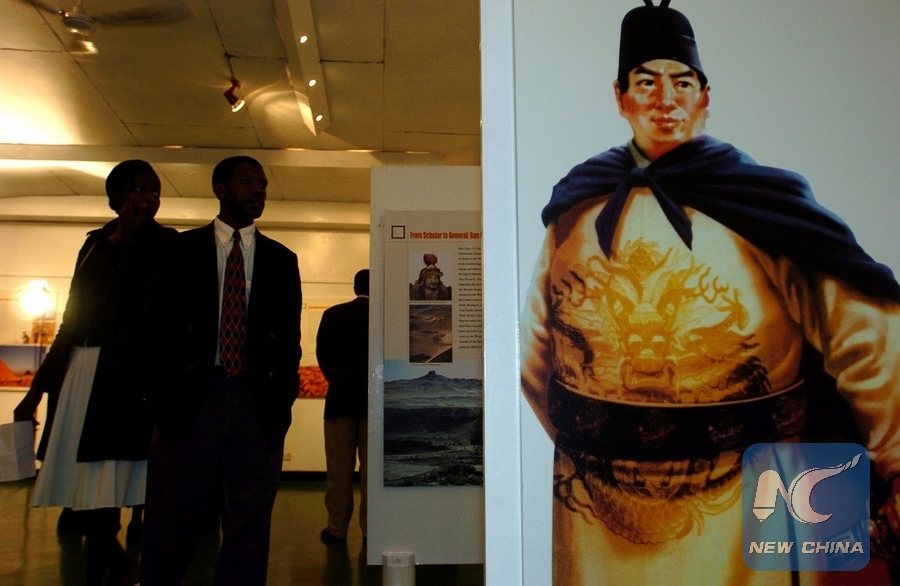
File photo shows visitors look around on an photo exhibition to commemorate ancient Chinese navigator Zheng He(1371-1433) in Nairobi, capital of Kenya. As a trade and political emissary of the Chinese emperor, Zheng He and his 27,000-men in some 200 ships traveled more than 50,000 kilometers and visited more than 30 countries in Asia and Africa, over a period of 28 years from 1405 to 1433. His voyages were 87 years earlier than Columbus, 92 years earlier than Vasco da Gama and 114 years earlier than Magellan. (Xinhua Photo/Yang Lei)
by Christine Lagat and Lu Duobao
NAIROBI, Sept. 6 (Xinhua) -- The Digital Silk Road envisioned by China will promote sustainable development through harnessing and application of big data to solve challenges facing the planet, an expert said on Monday.
Guo Huadong, a professor at the Institute of Remote Sensing and Digital Earth at the Chinese Academy of Sciences, said a digital version of the Belt and Road Initiative is in the works to enhance knowledge sharing on sustainable development and green growth.
"The Digital Silk Road is part of the Belt and Road Initiative and focuses on collection and sharing of big data among countries for application in fields that advances human welfare," Guo said.
He spoke to Xinhua on the sidelines of a conference on climate, ecosystems and livelihoods for Africa in the Kenyan capital, Nairobi.
Dozens of African and Chinese scientists are attending the three-day conference to explore strategic areas of collaboration aimed at revitalizing green agenda in the world's second largest continent.
The UN Environment Program (UNEP), the World Academy of Sciences, the Chinese Academy of Sciences and the National Natural Science Foundation of China organized the dialogue forum for Chinese and African scientists.
Guo noted that African countries will benefit from the roll-out of a Digital Silk Road, which will be implemented in three phases.
"Smart use of big data will enable African countries respond better to climate change and natural disasters. Its application in agriculture will boost food security," said Guo.
He said the initial implementation phase of the Digital Silk Road will involve setting up supportive infrastructure, recruitment of personnel and forging partnerships among countries within the framework of the Belt and Road Initiative.
"The second implementation phase of Digital Silk Road will focus on data collection and analysis to inform decision-making," Guo said. "Countries require data-driven solution to achieve sustainable development goals."
He noted that developing countries will benefit immensely from access to big data to help deal with social, economic and environmental challenges, such as ecological disasters like droughts and floods.
Guo added that the use of satellite technology to monitor weather, land use practices, urban settlements and natural resources management forms a critical component of Digital Silk Road.

